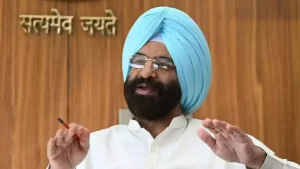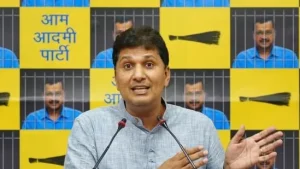New Delhi – Delhi’s severely deteriorating air quality on Tuesday sparked an intense Delhi pollution blame game with the Bharatiya Janata Party and Aam Aadmi Party each accusing the other of responsibility for the crisis. The capital woke up to a toxic haze the day after Diwali as firecracker bursting continued overnight in violation of restrictions set by the Supreme Court last week, providing ammunition for political adversaries to target each other.
The Delhi pollution blame game reflects the deep partisan divide over environmental governance, with both parties prioritizing political point-scoring over collaborative solutions to address the capital’s annual air quality emergency that threatens public health.
BJP Accuses Punjab Government of Deliberate Provocation

At a press conference, Delhi environment minister Manjinder Singh Sirsa intensified the Delhi pollution blame game by alleging that the AAP-led government in Punjab was deliberately trying to increase air pollution in Delhi. “Over the past four days, stubble-burning incidents in Punjab have surged sharply — and this is no coincidence. Farmers are being pressured and provoked to burn stubble so that pollution in Delhi can be used politically to target the Delhi government,” Sirsa claimed.
This explosive accusation in the Delhi pollution blame game suggested a coordinated conspiracy by Punjab’s AAP government to weaponize environmental degradation for political advantage, a charge that immediately drew fierce rebuttals from AAP leaders.
AAP Condemns Accusations as “Shameful”


In response to BJP’s allegations, AAP’s Delhi unit chief Saurabh Bharadwaj called the accusations in this Delhi pollution blame game “shameful” and accused the government of “playing with the lives of people and children.” He defended Punjab’s Sikh farmers against what he characterized as unfair targeting for political purposes.
“When asked about hiding pollution data by CPCB and DPCC in a press conference of a BJP minister, the response was evasive,” Bharadwaj stated, turning the Delhi pollution blame game back on the ruling party by alleging data manipulation. “I can say about the Punjab Sikh farmers that they would never conspire to defame Diwali, accusing them is shameful.”
Religious Dimension Added to Delhi Pollution Blame Game
Bharadwaj further escalated the Delhi pollution blame game by introducing a religious dimension to the controversy. “Sikh Gurus had given their lives for Hindus, accusing them is a sin,” he added, suggesting that BJP’s targeting of Punjab farmers amounted to disrespect for Sikh sacrifice and communal harmony.
This rhetorical strategy in the Delhi pollution blame game attempted to reframe environmental accusations as attacks on a religious community, raising the political stakes beyond mere policy disagreements.
Questions Raised About Missing Pollution Data
In separate posts, Bharadwaj questioned why PM2.5 and PM10 levels for Diwali night “were not available” in Central Pollution Control Board data, adding another dimension to the Delhi pollution blame game. “Why did most DPCC Air pollution monitoring stations show missing data on Diwali night?” he asked, suggesting deliberate suppression of evidence showing severe pollution levels.
These allegations of data manipulation transformed the Delhi pollution blame game from disputes over causation to questions about transparency and honesty in reporting environmental conditions to citizens.
AAP Leader Criticizes BJP’s Finger-Pointing
AAP leader Gopal Rai joined the Delhi pollution blame game by highlighting what he characterized as BJP’s hypocrisy. “The BJP government is blaming neighbouring states for Delhi’s pollution, despite being in power,” Rai stated, pointing out that the ruling party controls both the central government and Delhi’s administration, making blame-shifting less credible.
This argument in the Delhi pollution blame game emphasized that parties in power bear primary responsibility for addressing crises rather than deflecting blame to opposition-governed states.
Congress Joins Delhi Pollution Blame Game
Congress national spokesperson Shama Mohamed also participated in the Delhi pollution blame game, accusing the BJP government in Delhi of failing to implement the Supreme Court’s order on firecracker restrictions. “CM Rekha Gupta and Delhi Police then failed to implement the court order, and crackers were burst till midnight. This toxic air is endangering children and the elderly. BJP government has completely failed Delhi and its people!” Mohamed stated.
The Congress intervention in the Delhi pollution blame game demonstrated how opposition parties across the spectrum united in criticizing the BJP’s environmental governance.
Chief Minister Defends Government Actions


Delhi Chief Minister Rekha Gupta countered the Delhi pollution blame game by attacking the previous Arvind Kejriwal-led AAP government, saying they had imposed a blanket ban on firecrackers because they weren’t able to effectively implement any anti-pollution measures. This historical comparison attempted to shift the Delhi pollution blame game’s focus to AAP’s past governance record.
Gupta thanked the Supreme Court for allowing bursting of green crackers and appreciated city residents for “celebrating responsibly and prioritizing joy over pollution. The people placed their faith in the Delhi Government and celebrated Diwali with full enthusiasm. Our government remains deeply concerned about the pollution and has been taking effective measures to control it.”
Multiple Factors Cited in Pollution Crisis
Delhi education minister Ashish Sood acknowledged that Delhi residents who broke rules were responsible but argued the Delhi pollution blame game should recognize multiple causative factors. “The people who broke the rule of not bursting crackers after 10pm are responsible, but it should also be understood that firecrackers are not the only cause of air pollution in Delhi. Many factors determine this, such as the events in adjoining states,” he stated.
This more nuanced position in the Delhi pollution blame game attempted to distribute responsibility across multiple actors—rule-breaking residents, neighboring states, and various pollution sources—rather than accepting or assigning singular blame.
Public Health Cost of Political Battles
While the Delhi pollution blame game continues with accusations flying between political parties, Delhi’s residents—particularly children and elderly with respiratory conditions—bear the health consequences of toxic air quality regardless of which party deserves blame for the crisis.

